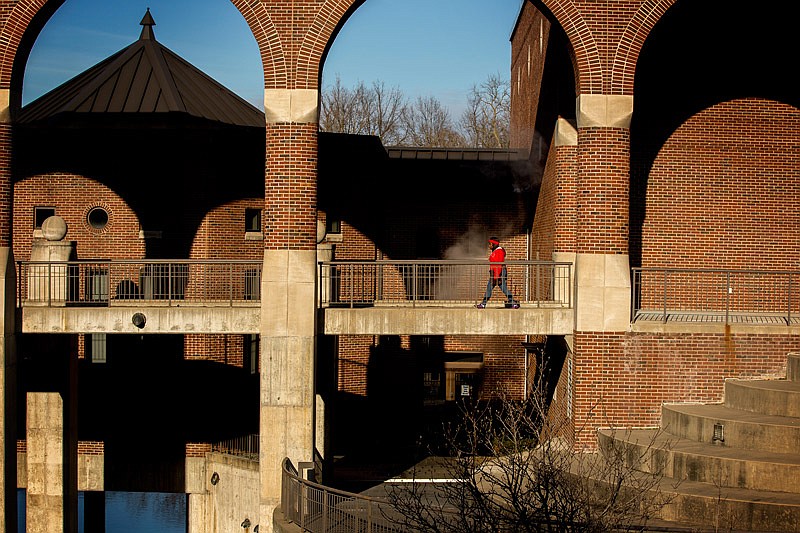If Missouri lawmakers agree with Rep. Courtney Allen Curtis, the state will increase its funding to Lincoln University and St. Louis' Harris-Stowe University to make up for past underfunding of the two historically black colleges.
Curtis, D-Ferguson, told members of the House Special Committee on Urban Issues the "Equity in Higher Education Funding Program simply tries to provide equity in higher education funding, period," to all public colleges and universities in Missouri - but specially is needed for LU and Harris-Stowe.
In response to a question during the 36-minute hearing on the bill, he argued "the University of Missouri system is funded at the expense of" the state's nine other four-year university campuses.
"I support better funding for all institutions," he said.
But, Curtis also reminded the committee, LU and Harris-Stowe historically "have not gotten the same funding as the University (of Missouri) System or the University of Missouri-Columbia."
Curtis, who chairs the committee, also noted the House discussed some of the proposed state budget bills Monday afternoon, before the committee hearing began.
"As we move through the budget process," he said, "we see yet again that, either because of the lack of funds or the (lack of) will to fund appropriately, we still have not given the historically black colleges in this state what they are due.
"And they have been hamstrung with regard to the growth of their student population, and in their ability to serve the greater community of Missouri."
June Dudenhoeffer of the Missouri National Education Association testified she's working with Jefferson City's Public Schools, because they are "struggling to have faculty and other staff members that are in proportion to their students."
Improving funding for LU and Harris-Stowe would be a "key beginning to doing this."
No one representing either school testified, and there were no opponents.
Curtis noted both Lincoln and Harris-Stowe were founded to serve African Americans who had been prohibited from attending other schools, including MU, because of Missouri's segregation policies.
And, while both schools now serve students from various ethnic backgrounds, they continue to suffer in comparison with other state-owned schools "simply because the same amount of money (as others receive) hasn't been invested in the facilities, the faculty and (either) institution itself."
For example, St. Louis NAACP President Adolphus M. Pruitt II testified, Harris-Stowe currently operates from a former St. Louis City high school building - and its classrooms and laboratories are outdated for modern students.
Lincoln was launched after the Civil War in 1866 by black soldiers and white officers of the 62nd and 65th Missouri Colored Infantry units who envisioned a school to teach basic reading, writing and arithmetic skills to newly freed slaves who had been denied any education under an 1847 state law.
LU became a state university in 1921 but, Curtis said, was denied the right to offer graduate degrees until the late 20th century.
Harris-Stowe actually is a combination of two schools, both founded by the St. Louis Public Schools to train teachers.
What became Harris Teachers College, for whites, began in the 1850s.
In 1890, with separate-but-equal laws in full force, what became Stowe Teachers College was formed to teach blacks to become teachers.
After the U.S. Supreme Court ruled in 1954 that segregation was unconstitutional, the St. Louis schools merged the two colleges into one - but under only the "Harris" name.
It wasn't until 1977, as the city schools were negotiating with the state to take over the college, Pruitt testified, that the "Stowe" name was restored.
In his prepared testimony given to the committee, Pruitt said: "The importance of these institutions to provide instruction, research, and public service capacity to help our state grow and prosper cannot be overstated."
Pruitt, Curtis and Ellington all reminded the committee members that Lincoln also is a federal land grant institution eligible for federal funds when there is a state match - but Missouri never has provided all of the money needed for that match.
Curtis and Pruitt also said if lawmakers don't do something, the courts might be asked to step in.
They noted a federal court last year told Maryland it had to provide more money to its four historically black colleges because of similar underfunding.
The Washington Post reported last November the judge ordered Maryland to "establish a set of new, unique and high-demand programs at each historically black institution."
Rep. Brandon Ellington, D-Kansas City, reminded his colleagues on the committee that "we've been severely under-funding these schools for years; it's a significant issue."
Curtis acknowledged passing his proposal into law this year wouldn't affect the budget being written now for the 2018-19 state business year that begins July 1.
But, said after the hearing, even though lawmakers have less than eight weeks to go before this General Assembly session ends May 18, there's still time to get his bill to the House floor and passed through both houses as a law for Gov. Eric Greitens to sign.

